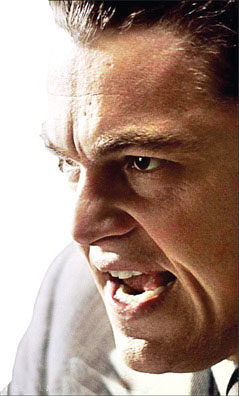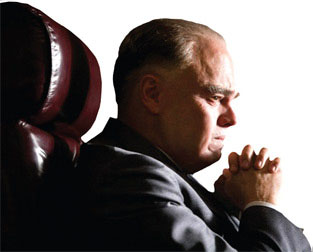 DiCaprio’s prowess as J. Edgar DiCaprio’s prowess as J. Edgar
By Dilshan Boange
Leonardo DiCaprio has come a long way since he captured the eyes of
filmgoers worldwide playing the underdog in James Cameron’s Titanic.
Although he had played several praiseworthy performances in movies such
as Total Eclipse and The Basketball Diaries, it was his role as Jack
Dawson in Titanic that made him a household name at least in this part
of the world.
 From playing lead roles in movies such as Catch Me If You Can, Gangs
of New York, Shutter Island and The Beach, the aviator DiCaprio has
matured with exceptional acting prowess honed with age and fitting into
roles that enable him to explore new vistas as an actor. From playing lead roles in movies such as Catch Me If You Can, Gangs
of New York, Shutter Island and The Beach, the aviator DiCaprio has
matured with exceptional acting prowess honed with age and fitting into
roles that enable him to explore new vistas as an actor.
Directed by Hollywood screen legend Clint Eastwood the biopic of the
founder Director of USA’s Federal Bureau of Investigations (FBI) –J.
Edgar Hoover titled J. Edgar, stars DiCaprio in the lead role portraying
the life and times of the man who was considered to be the most powerful
policing figure in the corridors of power in the USA.
The rise to power and through the unrelenting pursuit of professional
accomplishment are marked as attributes of Hoover’s character which
DiCaprio brings out in an electrifying way. The film is without a doubt
one of the best performances that DiCaprio has delivered thus far in his
film career.
Desire
The film is a powerful portrayal of an exceptionally driven person
whose desire to realise success in his professional domain and thereby
reap star status in the public eye, while being burdened with the
insecurities of having possible sexual orientations that would be
condemned in mainstream US society as ‘Un-American’.
DiCaprio brilliantly brings out this dilemma within the man whose
power holds on power players in the USA ranging from civil rights
activists to presidents by showing the shifts in demeanour when he is in
spaces that are public and then private.
The extraordinary acting talents of DiCaprio brings out the changes
in pace and pulse between the young Hoover and the aged FBI’s Director
in his twilight years, maintained the core essences of that
characteristics unyielding the authoritarian and fastidious ways.
The start of the film shows J. Edgar Hoover in his office, aged and
in his twilight years. A writer, known as Agent Smith, enters and what
ensues is that Hoover begins to tell the story of the origin of the FBI.
It is as we can see a historic moment albeit clearly away from the
public eye as the founder of the FBI begins to put down in his own words
the record of the legacy he has bequeathed to the people of his country
in the form of a premier policing body dedicated to protect the people
and the State.
Primitive
Hoover explains to Agent Smith that the story begins in 1919, when A.
Mitchell Palmer was Attorney General and Hoover’s boss at the Justice
Department. One night an assassination attempt, is made on Palmer at his
residence, who escapes unharmed when the bomb explodes earlier than
intended.
Hoover recalls that the police handling of the crime scene was
primitive, and that it was that night that he realised the significance
of scientific means to solve crime.
Hoover is shown later visiting his mother, Anna Marie, and tells her
that Palmer has placed him to head a new anti-radical division. Thus
begins his life-long hunt for communists and other dissident subversive
elements who threaten the way of life of the people of the USA and
begins his climb to assume the role of guardianship over the security of
the nation.
Controversy
A life rigged with controversy and abounding in commendation, charted
with egotistic wrangles with bureaucrats and policy makers while having
genuine love for professional excellence J. Edgar is brought to life by
DiCaprio unlike any other character he has played so far in his career.
With the acting talents of Judi Dench, Naomi Watts and Armie Hammer
playing Clyde Tolson, Hoover’s second in command and life-long
companion; J. Edgar is a magnificent work of film which will q lasting
impression on the viewer. |

